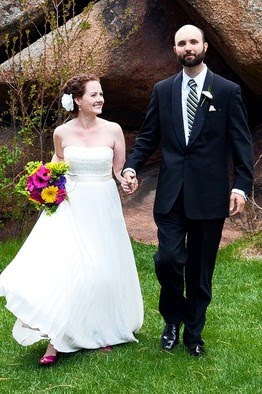
Please review the divorce calculator mentioned at the end of this article, which contains a relevant cite from attorney Kelly Chang Rickert.
How long will your marriage last? Depends on if you smoke, which church you go to, and which state you live in. Anneli Rufus on the shocking statistics.
You can't guarantee the longevity of a marriage, but what you can do is play the odds.
Researchers have studied marriage success rates from nearly every conceivable angle, and what they've found is that everything from smoking habits to what state you live in can predict how likely it is that your union will survive. Here are 15 ways to gauge whether your marriage is for the long haul—or on the fast track to Splitsville.
1. If you're a married American, your marriage is between 40 and 50 percent likely to end in divorce.After peaking at 50 percent in the 1980s, the national divorce rate
has dropped steadily, but in the public's mind, that outdated "half of all marriages" figure still sticks—and scares. "Inflated divorce statistics create an ambivalence about marriage," says Tara Parker-Pope, author of
For Better: The Science of a Good Marriage. "The bottom line is that modern marriages are getting more and more resilient. With each generation, we're getting a little better about picking mates. A different kind of marriage is emerging in this century." (Source: David Popenoe, "The Future of Marriage in America," University of Virginia/National Marriage Project/The State of Our Unions, 2007)
2. If you live in a red state, you're 27 percent more likely to get divorced than if you live in a blue state.
Maybe that's because red-state couples traditionally marry younger—and the younger the partners, the riskier the marriage. According to the U.S. Census Bureau, the states with the lowest median age at marriage are Utah, Arkansas, Kentucky, and Oklahoma. (Source: National Vital Statistics Report, 2003; cited in The Compassionate Community: Ten Values to Unite America, by Jonathan Miller and Al Gore)
3. If you argue with your spouse about finances once a week, your marriage is 30 percent more likely to end in divorce than if you argue with your spouse about finances less frequently.
Money woes kill marriages.
The same study also found that couples with no assets at the beginning of a three-year period are 70 percent more likely to divorce by the end of that period than couples with $10,000 in assets. Most divorce risk factors—such as age and education level—correlate with poverty, says Statistics in Plain English author Timothy Urdan. "Whenever you see an explanation for anything, try to figure out what the explanations are for those explanations." (Source: Jeffrey Dew, "Bank on It: Thrifty Couples Are the Happiest," University of Virginia/National Marriage Project/The State of Our Unions, 2009)
4. If your parents were divorced, you're at least 40 percent more likely to get divorced than if they weren't. If your parents married others after divorcing, you're 91 percent more likely to get divorced.
This could be because witnessing our parents' divorces reinforces our ambivalence about commitment in a "disposable society," says Divorce Magazine publisher Dan Couvrette. "In most people's minds, it's easier to get a new car than fix the one you've got." (Source: Nicholas Wolfinger, Understanding the Divorce Cycle, Cambridge University Press, 2005)
5. If only one partner in your marriage is a smoker, you're 75 percent to 91 percent more likely to divorce than smokers who are married to fellow smokers.
"The more similar people are in their values, backgrounds, and life goals, the more likely they are to have a successful marriage," notes Tara Parker-Pope. From age to ethnicity to unhealthy habits, dissimilarities between spouses
increase divorce risks. (Source: Rebecca Kippen, Bruce Chapman and Peng Yu, "What's Love Got to Do With It? Homogamy and Dyadic Approaches to Understanding Marital Instability," Melbourne Institute of Applied Economic and Social Research, 2009)
6. If you have a daughter, you're nearly 5 percent more likely to divorce than if you have a son.This figure multiplies with the numbers of daughters or sons. "We think it happens because fathers get more invested in family life when they have boys," says Stephanie Coontz, author of Marriage, a History and director of
research for the Council on Contemporary Families.
(Source: Gordon Dahl and Enrico Moretti, "The Demand for Sons," published in the Review of Economic Studies, 2005)
7. If you're an evangelical Christian adult who has been married, there's a 26 percent likelihood that you've been divorced—compared to a 28 percent chance for Catholics and a 38 percent chance for non-Christians.
That's according to the evangelically affiliated Barna Research Group, whose long-term clients include the Disney Channel. The same study cited a 30 percent divorce rate for atheists.
(Source: The Barna Group, "Divorce Among Adults Who Have Been Married," 2008)
http://www.barna.org/barna-update/article/15-familykids/42-new-marriage-and-divorce-statistics-released
8. If you live in Wayne County, Indiana, and are over 15 years old, there's a 19.2 percent chance that you've been divorced.
This mostly rural county hugging the Ohio border, renowned in the 1920s as a KKK stronghold, leads the nation in percentage of divorced residents. Florida's Monroe County, which includes the Keys, holds second place at 18 percent. (Source: U.S. Census Bureau, 2008 estimates)
9. If both you and your partner have had previous marriages, you're 90 percent more likely to get divorced than if this had been the first marriage for both of you."A lot of
data shows that second marriages should be more successful than first marriages," says Tara Parker-Pope. But this statistic is skewed by serial marriers, "and no one has yet found a way to take the Larry Kings and Elizabeth Taylors out of the equation." (Source: Rebecca Kippen, Bruce Chapman and Peng Yu, "What's Love Got to Do With It? Homogamy and Dyadic Approaches to Understanding Marital Instability," Melbourne Institute of Applied Economic and Social Research, 2009)
10. If you're a woman two or more years older than your husband, your marriage is 53 percent more likely to end in divorce than if he was one year younger to three years older.
Wide age gaps between spouses can create sexual discord and other disagreements. "Our culture is so focused on personal satisfaction and happiness that some people feel this is a contributing factor in divorce," says lawyer Emily Doskow,
author of Nolo's Essential Guide to Divorce. "Each partner keeps saying, 'I know I could be happier.'" (Source: Rebecca Kippen, Bruce Chapman and Peng Yu, "What's Love Got to Do With It? Homogamy and Dyadic Approaches to Understanding Marital Instability," Melbourne Institute of Applied Economic and Social Research, 2009)
11. If you're of "below average" intelligence, you're 50 percent more likely to be divorced than those of "above average" intelligence.
Presented by University of Delaware education professor Linda Gottfredson, codirector of the Delaware-Johns Hopkins Project for the Study of Intelligence and Society, this figure joins assertions in Richard Herrnstein and Charles Murray's controversial 1994 bestseller The Bell Curve that those with IQs of 100 face a 28 percent probability of divorce in the first five years of marriage, compared to just a 9 percent probability for those with IQs of 130. (Source: Linda S. Gottfredson, "The General Intelligence Factor," Scientific American, Winter 1998, and Richard J. Herrnstein and Charles A. Murray, The Bell Curve: Intelligence and Class Structure in American Life, Simon & Schuster, 1994, page 176)
12. If you've been diagnosed with cervical cancer, your likelihood of getting divorced is 40 percent higher than standard rates; it's 20 percent higher if you've been diagnosed with testicular cancer.Norwegian Cancer Registry researcher Astri Syse
suspects that this is because these two cancers affect sexual activity and afflict mainly young people. Syse also found that breast-cancer survivors, an older group, are 8 percent less likely to divorce than their counterparts who have not had breast cancer. (Source: Astri Syse, "Couples More Likely to Divorce if Spouse Develops Cervical or Testicular Cancer," study presented at the European Cancer Conference, 2007)
13. If you have twins or triplets, your marriage is 17 percent more likely to end in divorce than if your children are not multiple births.Multiple births bring money woes, which
bring stress. "I always think of marriage as a bridge that connects two hills," says Brette Sember, author of The Divorce Organizer & Planner. "The bridge might be solid and well-made, but if an earthquake causes one or both hills to shake, the bridge is weakened." (Source: Stephen McKay, "The Effects of Twins and Multiple Births on Families and Their Living Standards," Twins and Multiple Births Association, 2010)
14. If you're a female serial cohabiter—a woman who has lived with more than one partner before your first marriage—then you're 40 percent more likely to get divorced than women who have never done so.
Although "playing house" seems like good practice for married life, it can also make living together seem
less permanent. "People feel like, 'If it doesn't work out, we can just step out of this,'" says lawyer Emily Doskow. Statistics show that marriages preceded by cohabitation have better chances of success when couples became officially engaged before moving in together.
(Source: Daniel T. Lichter, Zhenchao Qian, "Serial Cohabitation: Implications for Marriage, Divorce, and Public Policy," Brown University Population and Training Center, 2007)
15. If you're in a male same-sex marriage, it's 50 percent more likely to end in divorce than a heterosexual marriage.
If you're in a female same-sex marriage, this figure soars to 167 percent.
A research team led by Stockholm University demography professor Gunnar Anderson based
their calculations on legal partnerships in Norway and Sweden, where five out of every 1,000 new couples are same-sex. (Source: Gunnar Andersson, "Divorce-Risk Patterns in Same-Sex Marriages in Norway and Sweden," Institute for Marriage and Public Policy, 2004)
Want to assess your own marriage's chances of failure based on your personal demographics? Economist Betsey Stevenson created this "divorce calculator" for the Divorce360 website:
http://www.divorce360.com/content/divorcecalculator.aspx
 $plit ends By LINDA STASI Last Updated: 11:37 AM, March 29, 2011 Posted: 11:11 PM, March 28, 2011
$plit ends By LINDA STASI Last Updated: 11:37 AM, March 29, 2011 Posted: 11:11 PM, March 28, 2011 







